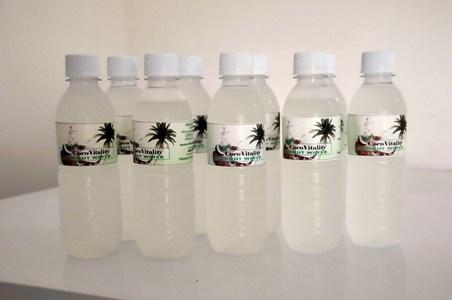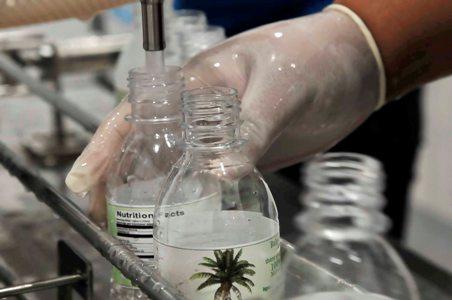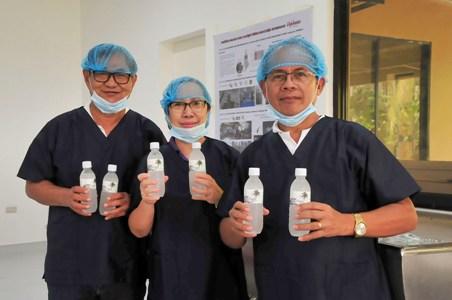For a tropical country, such as the Philippines, coconut is a common sight. During summer, coconut water is one cool drink that not only naturally hydrates but also comes with great benefits for the body. But due to its much desired light sweetness, it is often the coconut water tapped from young green coconuts that is being consumed and not from the mature ones.

But did you know that coconut water from mature coconut is more healthful?
According to Dr. Ofero Capariño, chief of the Bioprocessing Engineering from the Philippine Center for Postharvest Development and Mechanization (PhilMech), although young coconut water is relatively sweeter (5.5-6.5 oBrix), in terms of health benefits, there’s more to get from mature coconut water including electrolytes that human body needs such as potassium, sodium, magnesium, calcium and phosphorus. Mature coco water has more of them compared to coco water from young coconut,” Dr. Capariño revealed.
FAOSTAT (2016) reported that the Philippines ranks second among the coconut producing countries in the world with a total production of 13.83 billion nuts. During processing of copra and virgin coconut oil (VCO), coconut water is left unutilized.
Dr. Capariño mentioned the potential volume of coconut water from mature coconut that can be recovered is estimated at 2.4 billion liters per year. This became a motivation for him and his research team to look into the potential of mature coconut water. Their research attempted to process the unutilized coconut water into 100 percent pure without any additives and preservatives, nutritious, and safe bottled coconut water with the ultimate goal to help empower the small coconut farmers and increase their income.
From 2013 to 2015, through a project, “Development and Performance Evaluation of a Village Level Coconut Water Processing System,” the group was able to develop a village level coconut water processing system that is capable of processing 2,000 nuts, approximately 2,000 bottles (350 mL) coconut water per day. The generated technology was granted patent (Utility Model) on November 11, 2015.
One of the challenges that the research team had to address was the shelf life of coconut water because according to Dr. Capariño, when exposed to air, coconut water can accelerate quality degradation in terms of rancidity, cloudiness and discoloration caused by enzymes present in it.

“Coco water freshly extracted from mature coconut can last for 24 hours in ambient condition (room temperature). Three to four hours after you open the nut, it will start to ferment. After six hours, the sweetness will start to degrade making it sour. But when chilled, it can last up to three days. But what we want is to prolong it more by undergoing pasteurization below boiling point of water for 1 minute. By doing so, the pasteurized coco water can last 21 days stored under chilled condition,” Dr. Capariño explained.
According to Dr. Capariño, if the mature coco water undergoes pasteurization, it destroys disease causing microorganisms (pathogens) and inactivates spoilage enzymes that may be present in coconut water thereby extending the shelf life of the product. We can sterilize the coconut water by exposing it to very high temperature ranging from 132-149oC and kill all the pathogenic bacteria and even highly resistant spores such as Clostridium botulinum, but then the sensorial properties and nutritional quality of the product will be significantly affected,” he further explained.
With its promised potential in adding value to unutilized coconut water and increasing the income of farmers, the study won a Gold Award (Applied Research–TA/TV–Agriculture Category) during the 2016 National Research Symposium, organized by the Bureau of Agricultural Research (BAR).
Being a technology generator, Dr. Capariño ensured that what he developed will be used by the intended users. From 2015 to 2016, a village level coconut water processing technology incubation facility at the Department of Agriculture-Regional Field Office 5 was established with the support of the DA-Philippine Rural Development Project ? a World Bank-funded project. The idea is to showcase the developed technology to potential investors and function as a technology incubator for coconut farmers.
In 2016, the group of Dr. Capariño, together with the project leader, Dr. Gigi Calica, senior science research specialist from PhilMech, implemented the project, “Pilot Testing of Coconut Water Processing Enterprise in Selected Areas of the Philippines,” funded by BAR through its National Technology Commercialization Program.

“There is an international demand for coconut water as more people are getting health conscious. Drinking coconut water benefits our health by strengthening our body, reducing fatigue and taking care of our normal heart function,” explained Dr. Calica.
She further said that, the objective of the project is to pilot test the PhilMech developed village level coconut water processing system integrated to a VCO processing level of operations. PhilMech has developed a village level coconut water processing system that is capable of producing 100 percent natural bottled coconut water beverage without any additives or preservatives. “Specifically, what we wanted to determine was the potential market of coco water product derived from village level processing system enterprise”.
“Out of the by-product of coconut, which is coco water, being thrown away when processing copra or VCO, we found its use. To prolong its shelf-life, it can be concentrated, sterilized, but our focus is to have a technology that is feasible, doable in any community area,” said Dr. Capariño.
“Being an R&D institution under DA, we, at PHilMech are looking at developing this technology that really benefits the farmers. We balanced technology by making it affordable and gender-sensitive such as this village-level coconut water processing system,” he added.
He further said that, the pilot-testing aimed to empower the coconut farmers and to engage them in a community level business enterprise wherein they will do the operation from harvesting to finish product. They will also sell it. In the end, the farmers themselves will benefit.
To make the enterprise more viable, the project was tied up with a cooperative-beneficiary, COCOLIFE Multi-purpose Cooperative located in Pantukan, Compostela Valley. COCLIFE is a coconut farmers’ cooperative that is into Virgin Coconut Oil (VCO) production. The reason for this move is because in processing coconut into VCO, coco water turns into waste.
According to Mr. Rudy Ang, chair of COCOLIFE Multi-purpose Cooperative, Although they are still on pilot-testing, they have already started going to schools nearby one is Ateneo, to promote the product so that students will be aware of it and they can patronizing it.
Although the two-year project has developed the technology already, there are still activities to be done. Part of the project is to introduce the coco water to schools as an alternative to softdrink.
“We are targeting the students because it showed that they prefer drinking softdrink. We can lower the price so that it can compete with the price of softdrink. But the challenge really is to formulate a healthy drink that will suit their taste, and coco water is the best healthy alternative,” said Dr. Capariño.
At the moment, the Cooperative is selling a 350 ml bottle of coco water for 15 pesos. They are planning to lower the price once they have introduced the product to schools nearby. ### Rita T. dela Cruz
Source: https://www.bar.gov.ph
